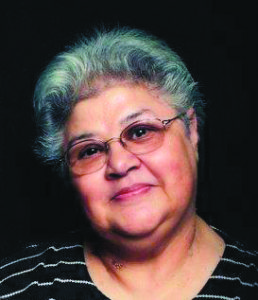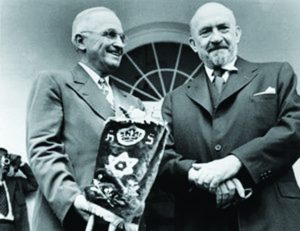

Improbable, if not impossible. How could a people who’d been scattered for two millennia reestablish a homeland on their ancient soil?
Against all odds, an irresistible desire to return grew in courageous Jewish men and women who set out to rebuild their decimated homeland.
A few weeks into his fourth term, Franklin D. Roosevelt died, and Harry S. Truman became president. For America generally, and certainly for the Jewish people, he was the right man at the right time.
Enter one of the strange stories of history. President Truman had served as an artillery captain in World War I, and one of the members of his battalion was a Jewish man named of Eddie Jacobson. After the war, the two of them went into an unlikely partnership and opened a haberdashery store in Kansas City. The store went bankrupt after three years, but Truman and Jacobson remained loyal friends.
In the aftermath of the war, The situation in the middle east had become untenable. The Jewish world wanted 100,000 Holocaust survivors to be allowed in, but the British foreign minister, Ernest Bevin, refused. President Truman put pressure on England, but Bevin refused.
Every day, violence in the region increased, and England saw it was in a no-win situation. So Bevin made a dramatic gesture. He declared, “England is going to leave on May 15, 1948. We give the problem to the United Nations.”
In hindsight, it is clear what Bevin intended. The Arabs outnumbered and outgunned the Jews. The outcome appeared to be inevitable.
The UN’s solution was a partition plan: an Arab state and a Jewish state. Jerusalem would be an “international city.” The Jewish state would be made of unconnected sections of land – militarily indefensible and economically unviable. The Jews, many opposed, accepted the proposed plan. The Arabs refused. So, the final decision was to be made by a vote in the UN General Assembly.
The Zionist leader Chaim Weizmann, who was by then old and half-blind, traveled to the U.S. to try and see Truman to get him to reinforce American support of the partition plan. Truman refused. The Jewish leadership put on whatever pressure it could, but to no avail. Truman would not see Weizmann.
Then the Jews sent in Eddie Jacobson. As documented in Truman’s memoirs, Jacobson said, “Mr. President, Harry, you’ve got to do me this one favor. See this tired, old man. He’s come halfway across the world to see you. Just give him a few minutes of your time.” And Truman reluctantly agreed.
Weizmann, a great diplomat, told Truman, and “You have the opportunity of the ages. If you’ll stay strong now, you’ll go down in history for all eternity.” Truman then called Warren Austin at the UN to inform him of American policy. For added drama, when the call came, Austin was in the middle of a speech about how America was backing out of the partition plan. But when he returned from the phone call, he said, “President Truman has instructed me that the United States supports in full the partition plan as adopted by the United Nations and will work to see it implemented.”
Truman was the only president of the 20th century who did not have a college education. In his generation, however, a secondary school education included the study of the Bible and ancient history, and therefore his audience would have known what few graduates of university history departments today know—that Cyrus II (“the Great”) was the Persian king who overthrew the Babylonian empire in 539 B.C. and subsidized the return to Jerusalem of the Jewish population that been held captive in Babylon for 70 years. Cyrus’ successors permitted the rebuilding of the Jerusalem Temple and city walls. Throughout the two-and-a-half millennia of historical calamities that followed, Cyrus served as the symbol of the righteous gentile ruler who would make possible the ultimate and irreversible return of the Jewish people to the Land of Israel—the restoration of their nationhood and security against their enemies.
In November 1953, a few months after leaving the presidency of the United States, Harry S. Truman was brought to the Jewish Theological Seminary in New York to meet a group of Jewish dignitaries. Accompanying him was his good friend Eddie Jacobson, a comrade from his Army days and former business partner in a short-lived men’s haberdashery 30 years earlier. Jacobson introduced his friend to the assembled theologians: “This is the man who helped create the State of Israel.” Truman retorted, “What do you mean, ‘helped to create’? I am Cyrus. I am Cyrus.”
Truman’s self-identification with Cyrus had nothing to do with self-glorification. It followed from his understanding of history and of the Bible.
The state of Israel was declared on May 15, 1948. And not two weeks later, Weizmann presented Truman with the traditional gift Jews give to heads of state: a Torah scroll. When Truman saw it, he said, “I always wanted one of those.”
People reacted to this story.
Show comments Hide commentsGod’s hand was evident throughout. Thanks for the history lesson. I wonder whatever happened to Truman’s Bible.